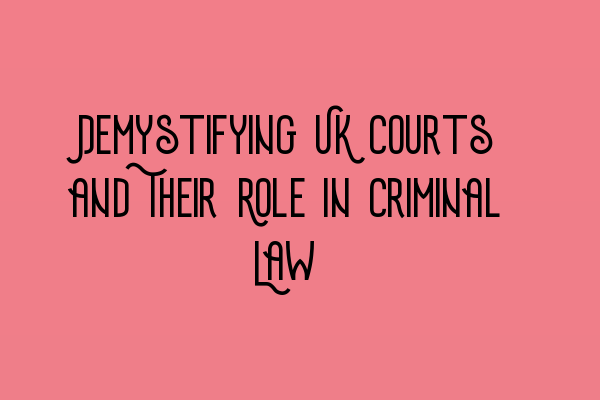Demystifying UK Courts and Their Role in Criminal Law
When it comes to understanding the UK legal system and its application in criminal law, many people find themselves overwhelmed by a labyrinth of complex procedures and unfamiliar terminology. In this blog post, we will unravel the mysteries of UK courts and shed light on their crucial role in the criminal justice system.
Before diving into the intricacies of UK courts, it’s important to note that the criminal justice system in the UK is renowned for its fairness and adherence to the rule of law. UK courts act as neutral arbiters, ensuring that individuals accused of crimes are given a fair trial and that justice is served.
The Hierarchy of UK Courts
The UK court system is structured in a hierarchy, with each level having different responsibilities and powers. At the top of the hierarchy sits the Supreme Court, which is the final court of appeal in the UK for both criminal and civil cases.
Below the Supreme Court are the Court of Appeal, the High Court, and the Crown Court. The Court of Appeal deals with appeals from the lower courts, reviewing cases to ensure that the law has been correctly applied. The High Court handles more complex cases and has the power to make binding decisions that set precedents. The Crown Court is where serious criminal cases are tried, including those involving indictable offenses.
It’s worth mentioning that there are also Magistrates’ Courts, which play a crucial role in the UK criminal justice system. These courts handle less serious criminal cases and act as the initial point of contact for most criminal matters. They are presided over by magistrates rather than judges.
The Role of UK Courts in Criminal Law
The primary role of UK courts in criminal law is to ensure that justice is served and the accused receives a fair trial. To achieve this, courts are responsible for the following:
- Adjudication: UK courts hear evidence, assess its credibility, and determine the guilt or innocence of the accused. The court weighs the evidence presented by the prosecution and the defense, ensuring that both sides have a fair opportunity to present their case.
- Sentencing: If the accused is found guilty, UK courts are responsible for determining an appropriate sentence. Sentencing aims to balance punishment with rehabilitation, taking into account factors such as the severity of the crime, the defendant’s criminal history, and any mitigating or aggravating circumstances.
- Appeals: UK courts also handle appeals from lower courts, ensuring that errors in the application of the law are rectified and justice is upheld. The Court of Appeal plays a crucial role in reviewing decisions made by lower courts, offering a hierarchy of review that protects the rights of the accused.
The Importance of Understanding UK Courts for Criminal Law Professionals
For criminal law professionals, such as solicitors, barristers, and legal practitioners, understanding the intricacies of UK courts is essential for effectively representing their clients. Familiarity with court procedures, rules of evidence, and the hierarchy of courts enables professionals to navigate the system with confidence and provide the best possible legal representation.
To further enhance your knowledge and expertise in criminal law, consider attending workshops and seminars on criminal practice. These events provide valuable insights, networking opportunities, and the chance to learn from seasoned professionals. Workshops and Seminars on Criminal Practice: Expanding Your Expertise is an excellent resource to explore.
Moreover, participating in an SQE Criminal Law study group can be invaluable for aspiring legal professionals. Collaborating with like-minded individuals, discussing complex legal issues, and sharing study materials can enhance your understanding and preparation for the SQE Criminal Law assessment. Check out Enhancing Your SQE Criminal Law Study Group Experience for more information.
The Takeaway
Demystifying UK courts and their role in criminal law is essential for both legal professionals and individuals seeking a better understanding of the justice system. By understanding the hierarchy of UK courts and their responsibilities, you can navigate the legal landscape more effectively and ensure justice is served.
For a closer look at criminal evidence rules and how they impact the outcomes of cases, our article on Decoding Criminal Evidence Rules: A Detailed Analysis provides a comprehensive analysis.
Additionally, if you’re curious about the process of state prosecution in the UK and the role of the Crown Prosecution Service, our article on Public Prosecutions in the UK: A Closer Look at State Prosecution offers valuable insights.
Lastly, for an inside look at UK police procedures in criminal cases and their impact on the legal process, don’t miss our article on Inside Look: Uncovering UK Police Procedures in Criminal Cases.
